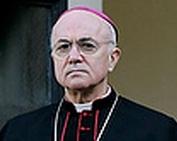Vatican Diary / Viganò, the Untouchable
The Chiesa
The current nuncio to Washington cannot stand having been driven out of Rome. And he is reacting against his archenemy, Cardinal Bertone. He has many supporters in the curia. And the pope is getting caught in the fray VATICAN CITY, January 26, 2012 – The two texts reproduced in their entirety further below are: – a letter dated July 7, 2011 to Benedict XVI from then secretary general of the governorate of Vatican City-State, Carlo Maria Viganò, now the nuncio in the United States, made public during the broadcast of the television program "The untouchables" on the evening of January 25, on the Italian channel "la 7"; – the statement released on January 26, with regard to this same broadcast, by the director of the Vatican press office, Fr. Federico Lombardi. Viganò's letter to Benedict XVI was the showpiece of this episode of "The untouchables." It was exhibited together with a sheaf of other letters also written by Viganò to the pope and to secretary of state Tarcisio Bertone. It is logical to presume that the copies of these letters came to the producer of the broadcast, Gianluigi Nuzzi,, directly or indirectly, from the sender rather than from the recipients. The statement from Fr. Lombardi expresses "disappointment over the release of confidential documents," but does not accuse anyone. The broadcast was given more weight by the fact that three officials of the Holy See took part in it. Two of them were interviewed at their respective residences: Bishop Giorgio Corbellini and Cardinal Velasio de Paolis. One was a guest in studio: the director of "L'Osservatore Romano," Giovanni Maria Vian. The cardinal who was interviewed while having his identity concealed could have been de Paolis himself, recorded without his knowledge while he was speaking off the record. Corbellini, who was deputy secretary general of the governorate of Vatican City-State from 1993 to 2011, and began his ecclesiastical career in the shadow of Salesian cardinal Rosalio Castillo Lara (who for his part did a great deal to open doors for Tarcisio Bertone, an ordinary priest at the time), appeared to the viewers to be the one most willing, with silences and smiles rather than with clear statements, to confirm the basic premise of the broadcast: that Viganò, the moralizing loner, had been driven out, at the behest of Cardinal Bertone above all, for his stubbornness in enforcing the norms of transparency and honesty. But the statement from Fr. Lombardi speaks of "biased information." And, understandably, it makes no reference to the presence of officials of the Holy See on the program. The statement acknowledges the "very positive" results obtained by Viganò, but relativizes them, recalling that they were obtained partly on account of other factors "during the presidency of Cardinal Lajolo." Whose role, however, is evaluated negatively by Viganò in his letter to the pope made public by Nuzi. It could be significant that the statement makes explicit reference, as an important contributing factor to the repair of the balance sheet of Vatican City-State, to the "very noteworthy" results obtained by the Vatican Museums. In fact, it is with the deputy administrator of the Museums, Monsignor Paolo Nicolini, that Viganò had one of his most bitter disputes during his mandate, with serious reciprocal accusations. The statement also reveals that the "Finance and Management Committee" made up of the bankers Pellegrino Capaldo, Carlo Fratta Pasini, Massimo Ponzellini, and Ettore Gotti Tedeschi (the last of these went on to become the president of the Institute for Works of Religion, the Vatican bank) answers not only to the governorate, but also to the secretariat of state. But this does not mean that this an entirely "Bertonian" structure. Ponzellini was called to be part of it at the recommendation of Cardinal Giovanni Battista Re, one of the curia leaders of the anti-Bertone wing. Re himself then had an audience with the pope to plead for Viganò to be kept on at the governorate. The strongest argument in the statement used against the premise of the broadcast is the fact that in place of Viganò, Benedict XVI did not appoint someone with a reputation as a deal maker, but a churchman of great juridical competence and undisputed personal honesty: Bishop Giuseppe Sciacca, known to and appreciated by Bertone, but also personally esteemed by Benedict XVI and his personal secretary, Georg Gänswein. The statement ends by calling "unquestionable" the esteem and trust that the pope has for Viganò. This could be a way of asking the churchman, clearly embittered by his removal from Rome, to put aside his own resentment from now on. On the other hand, the statement could not remind Viganò that it is not permissible for him to complain about the failure to fulfill a promise that he would succeed Lajolo as president of the governorate of Vatican City-State, assuming that such a promise was made to him. Nor could it set out in black and white that such promises cannot be made by someone, like the secretary of state, who does not have the power to do so. Such appointments, in fact, belong only to the pope. And that's without counting the fact that none of Viganò's predecessors made the leap from secretary to president. Not Bruno Bertagna. Not Gianni Danzi. Not Renato Boccardo, who also had to leave his post prematurely, for the less than glamorous episcopal see of Spoleto-Norcia. And he left without protesting, and without sending letters left and right. With a style quite different from that of the current nuncio to Washington. Viganò's nephew, Archbishop Carlo Maria Polvani, 47, heads the information office of the secretariat of state that oversees "L'Osservatore Romano," Vatican Radio, and also the press office directed by Fr. Lombardi.
|
.
Any original material on these pages is copyright © BishopAccountability.org 2004. Reproduce freely with attribution.
